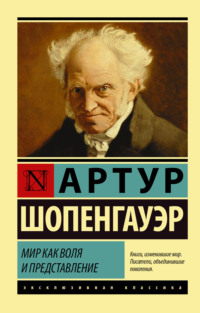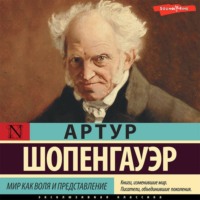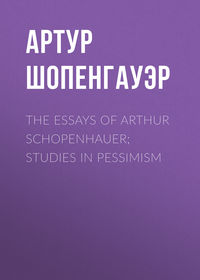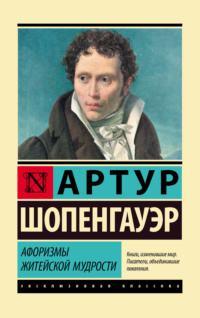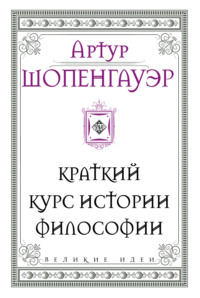 полная версия
полная версияThe World as Will and Idea (Vol. 1 of 3)
This quality of concepts by which they resemble the stones of a mosaic, and on account of which perception always remains their asymptote, is also the reason why nothing good is produced in art by their means. If the singer or the virtuoso attempts to guide his execution by reflection he remains silent. And this is equally true of the composer, the painter, and the poet. The concept always remains unfruitful in art; it can only direct the technical part of it, its sphere is science. We shall consider more fully in the third book, why all true art proceeds from sensuous knowledge, never from the concept. Indeed, with regard to behaviour also, and personal agreeableness in society, the concept has only a negative value in restraining the grosser manifestations of egotism and brutality; so that a polished manner is its commendable production. But all that is attractive, gracious, charming in behaviour, all affectionateness and friendliness, must not proceed from the concepts, for if it does, “we feel intention, and are put out of tune.” All dissimulation is the work of reflection; but it cannot be maintained constantly and without interruption: “nemo potest personam diu ferre fictum,” says Seneca in his book de clementia; and so it is generally found out and loses its effect. Reason is needed in the full stress of life, where quick conclusions, bold action, rapid and sure comprehension are required, but it may easily spoil all if it gains the upper hand, and by perplexing hinders the intuitive, direct discovery, and grasp of the right by simple understanding, and thus induces irresolution.
Lastly, virtue and holiness do not proceed from reflection, but from the inner depths of the will, and its relation to knowledge. The exposition of this belongs to another part of our work; this, however, I may remark here, that the dogmas relating to ethics may be the same in the reason of whole nations, but the action of every individual different; and the converse also holds good; action, we say, is guided by feelings, – that is, simply not by concepts, but as a matter of fact by the ethical character. Dogmas occupy the idle reason; but action in the end pursues its own course independently of them, generally not according to abstract rules, but according to unspoken maxims, the expression of which is the whole man himself. Therefore, however different the religious dogmas of nations may be, yet in the case of all of them, a good action is accompanied by unspeakable satisfaction, and a bad action by endless remorse. No mockery can shake the former; no priest's absolution can deliver from the latter. Notwithstanding this, we must allow, that for the pursuit of a virtuous life, the application of reason is needful; only it is not its source, but has the subordinate function of preserving resolutions which have been made, of providing maxims to withstand the weakness of the moment, and give consistency to action. It plays the same part ultimately in art also, where it has just as little to do with the essential matter, but assists in carrying it out, for genius is not always at call, and yet the work must be completed in all its parts and rounded off to a whole.17
§ 13. All these discussions of the advantages and disadvantages of the application of reason are intended to show, that although abstract rational knowledge is the reflex of ideas of perception, and is founded on them, it is by no means in such entire congruity with them that it could everywhere take their place: indeed it never corresponds to them quite accurately. And thus, as we have seen, many human actions can only be performed by the help of reason and deliberation, and yet there are some which are better performed without its assistance. This very incongruity of sensuous and abstract knowledge, on account of which the latter always merely approximates to the former, as mosaic approximates to painting, is the cause of a very remarkable phenomenon which, like reason itself, is peculiar to human nature, and of which the explanations that have ever anew been attempted, are insufficient: I mean laughter. On account of the source of this phenomenon, we cannot avoid giving the explanation of it here, though it again interrupts the course of our work to do so. The cause of laughter in every case is simply the sudden perception of the incongruity between a concept and the real objects which have been thought through it in some relation, and laughter itself is just the expression of this incongruity. It often occurs in this way: two or more real objects are thought through one concept, and the identity of the concept is transferred to the objects; it then becomes strikingly apparent from the entire difference of the objects in other respects, that the concept was only applicable to them from a one-sided point of view. It occurs just as often, however, that the incongruity between a single real object and the concept under which, from one point of view, it has rightly been subsumed, is suddenly felt. Now the more correct the subsumption of such objects under a concept may be from one point of view, and the greater and more glaring their incongruity with it, from another point of view, the greater is the ludicrous effect which is produced by this contrast. All laughter then is occasioned by a paradox, and therefore by unexpected subsumption, whether this is expressed in words or in actions. This, briefly stated, is the true explanation of the ludicrous.
I shall not pause here to relate anecdotes as examples to illustrate my theory; for it is so simple and comprehensible that it does not require them, and everything ludicrous which the reader may remember is equally valuable as a proof of it. But the theory is confirmed and illustrated by distinguishing two species into which the ludicrous is divided, and which result from the theory. Either, we have previously known two or more very different real objects, ideas of sense-perception, and have intentionally identified them through the unity of a concept which comprehends them both; this species of the ludicrous is called wit. Or, conversely, the concept is first present in knowledge, and we pass from it to reality, and to operation upon it, to action: objects which in other respects are fundamentally different, but which are all thought in that one concept, are now regarded and treated in the same way, till, to the surprise and astonishment of the person acting, the great difference of their other aspects appears: this species of the ludicrous is called folly. Therefore everything ludicrous is either a flash of wit or a foolish action, according as the procedure has been from the discrepancy of the objects to the identity of the concept, or the converse; the former always intentional, the latter always unintentional, and from without. To seem to reverse the starting-point, and to conceal wit with the mask of folly, is the art of the jester and the clown. Being quite aware of the diversity of the objects, the jester unites them, with secret wit, under one concept, and then starting from this concept he receives from the subsequently discovered diversity of the objects the surprise which he himself prepared. It follows from this short but sufficient theory of the ludicrous, that, if we set aside the last case, that of the jester, wit must always show itself in words, folly generally in actions, though also in words, when it only expresses an intention and does not actually carry it out, or when it shows itself merely in judgments and opinions.
Pedantry is a form of folly. It arises in this way: a man lacks confidence in his own understanding, and, therefore, does not wish to trust to it, to recognise what is right directly in the particular case. He, therefore, puts it entirely under the control of the reason, and seeks to be guided by reason in everything; that is to say, he tries always to proceed from general concepts, rules, and maxims, and to confine himself strictly to them in life, in art, and even in moral conduct. Hence that clinging to the form, to the manner, to the expression and word which is characteristic of pedantry, and which with it takes the place of the real nature of the matter. The incongruity then between the concept and reality soon shows itself here, and it becomes evident that the former never condescends to the particular case, and that with its generality and rigid definiteness it can never accurately apply to the fine distinctions of difference and innumerable modifications of the actual. Therefore, the pedant, with his general maxims, almost always misses the mark in life, shows himself to be foolish, awkward, useless. In art, in which the concept is unfruitful, he produces lifeless, stiff, abortive mannerisms. Even with regard to ethics, the purpose to act rightly or nobly cannot always be carried out in accordance with abstract maxims; for in many cases the excessively nice distinctions in the nature of the circumstances necessitate a choice of the right proceeding directly from the character; for the application of mere abstract maxims sometimes gives false results, because the maxims only half apply; and sometimes cannot be carried out, because they are foreign to the individual character of the actor, and this never allows itself to be entirely discovered; therefore, inconsistencies arise. Since then Kant makes it a condition of the moral worth of an action, that it shall proceed from pure rational abstract maxims, without any inclination or momentary emotion, we cannot entirely absolve him from the reproach of encouraging moral pedantry. This reproach is the significance of Schiller's epigram, entitled “Scruples of Conscience.” When we speak, especially in connection with politics, of doctrinaires, theorists, savants, and so forth, we mean pedants, that is, persons who know the things well in the abstract, but not in the concrete. Abstraction consists in thinking away the less general predicates; but it is precisely upon these that so much depends in practice.
To complete our theory it remains for us to mention a spurious kind of wit, the play upon words, the calembourg, the pun, to which may be added the equivocation, the double entendre, the chief use of which is the expression of what is obscene. Just as the witticism brings two very different real objects under one concept, the pun brings two different concepts, by the assistance of accident, under one word. The same contrast appears, only familiar and more superficial, because it does not spring from the nature of things, but merely from the accident of nomenclature. In the case of the witticism the identity is in the concept, the difference in the reality, but in the case of the pun the difference is in the concepts and the identity in the reality, for the terminology is here the reality. It would only be a somewhat far-fetched comparison if we were to say that the pun is related to the witticism as the parabola (sic) of the upper inverted cone to that of the lower. The misunderstanding of the word or the quid pro quo is the unintentional pun, and is related to it exactly as folly is to wit. Thus the deaf man often affords occasion for laughter, just as much as the fool, and inferior writers of comedy often use the former for the latter to raise a laugh.
I have treated laughter here only from the psychical side; with regard to the physical side, I refer to what is said on the subject in the “Parerga,” vol. II. ch. vi., § 98.18
§ 14. By means of these various discussions it is hoped that both the difference and the relation between the process of knowledge that belongs to the reason, rational knowledge, the concept on the one hand, and the direct knowledge in purely sensuous, mathematical intuition or perception, and apprehension by the understanding on the other hand, has been clearly brought out. This remarkable relation of our kinds of knowledge led us almost inevitably to give, in passing, explanations of feeling and of laughter, but from all this we now turn back to the further consideration of science as the third great benefit which reason confers on man, the other two being speech and deliberate action. The general discussion of science which now devolves upon us, will be concerned partly with its form, partly with the foundation of its judgments, and lastly with its content.
We have seen that, with the exception of the basis of pure logic, rational knowledge in general has not its source in the reason itself; but having been otherwise obtained as knowledge of perception, it is stored up in the reason, for through reason it has entirely changed its character, and has become abstract knowledge. All rational knowledge, that is, knowledge that has been raised to consciousness in the abstract, is related to science strictly so called, as a fragment to the whole. Every one has gained a rational knowledge of many different things through experience, through consideration of the individual objects presented to him, but only he who sets himself the task of acquiring a complete knowledge in the abstract of a particular class of objects, strives after science. This class can only be marked off by means of a concept; therefore, at the beginning of every science there stands a concept, and by means of it the class of objects concerning which this science promises a complete knowledge in the abstract, is separated in thought from the whole world of things. For example, the concept of space-relations, or of the action of unorganised bodies upon each other, or of the nature of plants, or of animals, or of the successive changes of the surface of the globe, or of the changes of the human race as a whole, or of the construction of a language, and so forth. If science sought to obtain the knowledge of its object, by investigating each individual thing that is thought through the concept, till by degrees it had learned the whole, no human memory would be equal to the task, and no certainty of completeness would be obtainable. Therefore, it makes use of that property of concept-spheres explained above, that they include each other, and it concerns itself mainly with the wider spheres which lie within the concept of its object in general. When the relations of these spheres to each other have been determined, all that is thought in them is also generally determined, and can now be more and more accurately determined by the separation of smaller and smaller concept-spheres. In this way it is possible for a science to comprehend its object completely. This path which it follows to knowledge, the path from the general to the particular, distinguishes it from ordinary rational knowledge; therefore, systematic form is an essential and characteristic feature of science. The combination of the most general concept-spheres of every science, that is, the knowledge of its first principles, is the indispensable condition of mastering it; how far we advance from these to the more special propositions is a matter of choice, and does not increase the thoroughness but only the extent of our knowledge of the science. The number of the first principles to which all the rest are subordinated, varies greatly in the different sciences, so that in some there is more subordination, in others more co-ordination; and in this respect, the former make greater claims upon the judgment, the latter upon the memory. It was known to the schoolmen,19 that, as the syllogism requires two premises, no science can proceed from a single first principle which cannot be the subject of further deduction, but must have several, at least two. The specially classifying sciences: Zoology, Botany, and also Physics and Chemistry, inasmuch as they refer all inorganic action to a few fundamental forces, have most subordination; history, on the other hand, has really none at all; for the general in it consists merely in the survey of the principal periods, from which, however, the particular events cannot be deduced, and are only subordinated to them according to time, but according to the concept are co-ordinate with them. Therefore, history, strictly speaking, is certainly rational knowledge, but is not science. In mathematics, according to Euclid's treatment, the axioms alone are indemonstrable first principles, and all demonstrations are in gradation strictly subordinated to them. But this method of treatment is not essential to mathematics, and in fact each proposition introduces quite a new space construction, which in itself is independent of those which precede it, and indeed can be completely comprehended from itself, quite independently of them, in the pure intuition or perception of space, in which the most complicated construction is just as directly evident as the axiom; but of this more fully hereafter. Meanwhile every mathematical proposition remains always a universal truth, which is valid for innumerable particular cases; and a graduated process from the simple to the complicated propositions which are to be deduced from them, is also essential to mathematics; therefore, in every respect mathematics is a science. The completeness of a science as such, that is, in respect of form, consists in there being as much subordination and as little co-ordination of the principles as possible. Scientific talent in general is, therefore, the faculty of subordinating the concept-spheres according to their different determinations, so that, as Plato repeatedly counsels, a science shall not be constituted by a general concept and an indefinite multiplicity immediately under it, but that knowledge shall descend by degrees from the general to the particular, through intermediate concepts and divisions, according to closer and closer definitions. In Kantian language this is called satisfying equally the law of homogeneity and that of specification. It arises from this peculiar nature of scientific completeness, that the aim of science is not greater certainty – for certainty may be possessed in just as high a degree by the most disconnected particular knowledge – but its aim is rather the facilitating of rational knowledge by means of its form, and the possibility of the completeness of rational knowledge which this form affords. It is therefore a very prevalent but perverted opinion that the scientific character of knowledge consists in its greater certainty, and just as false is the conclusion following from this, that, strictly speaking, the only sciences are mathematics and logic, because only in them, on account of their purely a priori character, is there unassailable certainty of knowledge. This advantage cannot be denied them, but it gives them no special claim to be regarded as sciences; for the special characteristic of science does not lie in certainty but in the systematic form of knowledge, based on the gradual descent from the general to the particular. The process of knowledge from the general to the particular, which is peculiar to the sciences, involves the necessity that in the sciences much should be established by deduction from preceding propositions, that is to say, by demonstration; and this has given rise to the old mistake that only what has been demonstrated is absolutely true, and that every truth requires a demonstration; whereas, on the contrary, every demonstration requires an undemonstrated truth, which ultimately supports it, or it may be, its own demonstration. Therefore a directly established truth is as much to be preferred to a truth established by demonstration as water from the spring is to water from the aqueduct. Perception, partly pure a priori, as it forms the basis of mathematics, partly empirical a posteriori, as it forms the basis of all the other sciences, is the source of all truth and the foundation of all science. (Logic alone is to be excepted, which is not founded upon perception but yet upon direct knowledge by the reason of its own laws.) Not the demonstrated judgments nor their demonstrations, but judgments which are created directly out of perception, and founded upon it rather than on any demonstrations, are to science what the sun is to the world; for all light proceeds from them, and lighted by their light the others give light also. To establish the truth of such primary judgments directly from perception, to raise such strongholds of science from the innumerable multitude of real objects, that is the work of the faculty of judgment, which consists in the power of rightly and accurately carrying over into abstract consciousness what is known in perception, and judgment is consequently the mediator between understanding and reason. Only extraordinary and exceptional strength of judgment in the individual can actually advance science; but every one who is possessed of a healthy reason is able to deduce propositions from propositions, to demonstrate, to draw conclusions. To lay down and make permanent for reflection, in suitable concepts, what is known through perception, so that, on the one hand, what is common to many real objects is thought through one concept, and, on the other hand, their points of difference are each thought through one concept, so that the different shall be known and thought as different in spite of a partial agreement, and the identical shall be known and thought as identical in spite of a partial difference, all in accordance with the end and intention which in each case is in view; all this is done by the faculty of judgment. Deficiency in judgment is silliness. The silly man fails to grasp, now the partial or relative difference of concepts which in one aspect are identical, now the identity of concepts which are relatively or partially different. To this explanation of the faculty of judgment, moreover, Kant's division of it into reflecting and subsuming judgment may be applied, according as it passes from the perceived objects to the concepts, or from the latter to the former; in both cases always mediating between empirical knowledge of the understanding and the reflective knowledge of the reason. There can be no truth which could be brought out by means of syllogisms alone; and the necessity of establishing truth by means of syllogisms is merely relative, indeed subjective. Since all demonstration is syllogistic, in the case of a new truth we must first seek, not for a demonstration, but for direct evidence, and only in the absence of such evidence is a demonstration to be temporarily made use of. No science is susceptible of demonstration throughout any more than a building can stand in the air; all its demonstrations must ultimately rest upon what is perceived, and consequently cannot be demonstrated, for the whole world of reflection rests upon and is rooted in the world of perception. All primal, that is, original, evidence is a perception, as the word itself indicates. Therefore it is either empirical or founded upon the perception a priori of the conditions of possible experience. In both cases it affords only immanent, not transcendent knowledge. Every concept has its worth and its existence only in its relation, sometimes very indirect, to an idea of perception; what is true of the concepts is also true of the judgments constructed out of them, and of all science. Therefore it must in some way be possible to know directly without demonstrations or syllogisms every truth that is arrived at through syllogisms and communicated by demonstrations. This is most difficult in the case of certain complicated mathematical propositions at which we only arrive by chains of syllogisms; for example, the calculation of the chords and tangents to all arcs by deduction from the proposition of Pythagoras. But even such a truth as this cannot essentially and solely rest upon abstract principles, and the space-relations which lie at its foundation also must be capable of being so presented a priori in pure intuition or perception that the truth of their abstract expression is directly established. But of mathematical demonstration we shall speak more fully shortly.
It is true we often hear men speak in a lofty strain of sciences which rest entirely upon correct conclusions drawn from sure premises, and which are consequently unassailable. But through pure logical reasoning, however true the premises may be, we shall never receive more than an articulate expression and exposition of what lies already complete in the premises; thus we shall only explicitly expound what was already implicitly understood. The esteemed sciences referred to are, however, specially the mathematical sciences, particularly astronomy. But the certainty of astronomy arises from the fact that it has for its basis the intuition or perception of space, which is given a priori, and is therefore infallible. All space-relations, however, follow from each other with a necessity (ground of being) which affords a priori certainty, and they can therefore be safely deduced from each other. To these mathematical properties we have only to add one force of nature, gravity, which acts precisely in relation to the masses and the square of the distance; and, lastly, the law of inertia, which follows from the law of causality and is therefore true a priori, and with it the empirical datum of the motion impressed, once for all, upon each of these masses. This is the whole material of astronomy, which both by its simplicity and its certainty leads to definite results, which are highly interesting on account of the vastness and importance of the objects. For example, if I know the mass of a planet and the distance of its satellite from it, I can tell with certainty the period of the revolution of the latter according to Kepler's second law. But the ground of this law is, that with this distance only this velocity will both chain the satellite to the planet and prevent it from falling into it. Thus it is only upon such a geometrical basis, that is, by means of an intuition or perception a priori, and also under the application of a law of nature, that much can be arrived at by means of syllogisms, for here they are merely like bridges from one sensuous apprehension to others; but it is not so with mere pure syllogistic reasoning in the exclusively logical method. The source of the first fundamental truths of astronomy is, however, properly induction, that is, the comprehension of what is given in many perceptions in one true and directly founded judgment. From this, hypotheses are afterwards constructed, and their confirmation by experience, as induction approaching to completeness, affords the proof of the first judgment. For example, the apparent motion of the planets is known empirically; after many false hypotheses with regard to the spacial connection of this motion (planetary course) the right one was at last found, then the laws which it obeyed (the laws of Kepler), and, lastly, the cause of these laws (universal gravitation), and the empirically known agreement of all observed cases with the whole of the hypotheses, and with their consequences, that is to say, induction, established them with complete certainty. The invention of the hypotheses was the work of the judgment, which rightly comprehended the given facts and expressed them accordingly; but induction, that is, a multitude of perceptions, confirmed their truth. But their truth could also be known directly, and by a single empirical perception, if we could pass freely through space and had telescopic eyes. Therefore, here also syllogisms are not the essential and only source of knowledge, but really only a makeshift.




